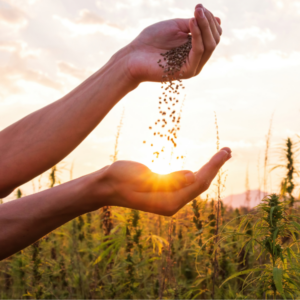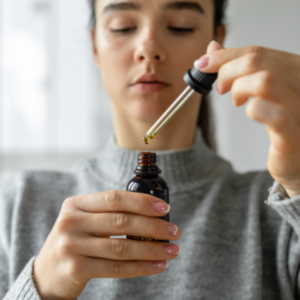
What happens to your brain on CBD? Cannabidiol (CBD) is one of the many compounds found in cannabis and hemp. Unlike its more famous cousin, THC, CBD doesn’t make you feel high or intoxicated.
CBD is a well-known alleviator of anxiety, inflammation, insomnia, pain, and other conditions. And like other cannabinoids present in cannabis and hemp, CBD interacts with our endocannabinoid system.
But what happens to your brain on CBD? Does CBD bind to cannabinoid receptors like THC? What’s happening inside the brain that makes CBD effective for mental health or relieves inflammation?
How the Brain Works Without CBD
To say our brain is a complex organ is an understatement. To understand what happens to your brain on CBD, we need to only focus on our endocannabinoid system (ECS).
The ECS is a cell-signalling system. It was discovered by investigating what happens to our brains on THC. But the ECS plays a role in our sleep, memory, mood, appetite, and reproduction whether we consume cannabis or not.
CBD is a plant cannabinoid like the molecules our bodies produce. Our body has two endogenous cannabinoids. They are:
- anandamide (AEA)
- 2-arachidonoylglyerol (2-AG)
These endocannabinoids bind to cannabinoid receptors in our brains and body. We have two primary receptors: CB1 and CB2.
We find CB1 receptors in the central nervous system and CB2 receptors in the peripheral nervous system. When our endogenous cannabinoids bind to these receptors, it signals pain relief or anti-inflammatory responses.
Overall, the point of the ECS is to keep our body’s in a state of homeostasis.
But sometimes, our endocannabinoid system isn’t enough on its own. As well, enzymes break down these endogenous cannabinoids.
The whole of plant cannabinoids, like THC or CBD, is to give your ECS the extra boost it may need. For example, THC is a well-known pain reliever that will bind to your CB1 receptors to provide relief.
But what about CBD? What happens to your brain on CBD?
What happens to your brain on CBD?
CBD is unlike THC in that it won’t make you feel high, but it also doesn’t bind to CB1 or CB2 receptors the way THC does.
Researchers believe CBD has a preventive function. That is, it prevents your natural, endogenous cannabinoids from breaking down too fast.
This means your ECS won’t have to work overtime to maintain homeostasis.
Some researchers believe this is called clinical endocannabinoid deficiency (CECD). And that it can contribute to certain conditions that appear to have no underlying cause but are associated with the ECS. (Conditions like fibromyalgia, dementia, or irritable bowel syndrome).
Still, others believe CBD does bind to a cannabinoid receptor, just one we haven’t discovered yet.
We know that CBD targets the serotonin 5-HT1A receptor, which researchers suspect is why CBD is effective at treating anxiety and neuropathic pain.
CBD also binds to vanilloid receptors, often called TRPV1 receptors. These receptors help regulate body temperature and control inflammation.
Researchers are still determining how GPR55 (the orphan receptor) regulates blood pressure, bone density and reabsorption. But naturally, CBD inhibits GPR55 signalling, which scientists link to CBD’s anti-cancerous effects.
Scientists also link CBD to its activation of PPARs (proliferator-activated receptors), which trigger antiproliferative effects that cause cancer to regress.
Interestingly, CBD may block CB1 receptors from fully interacting with THC, mitigating the latter’s effects.
As well, CBD inhibits the breakdown of anandamide, which is the endogenous version of THC.
What specifically happens to your brain on CBD?
So we have some understanding of what happens to your brain on CBD. But the information above sounds a little abstract. What precisely occurs inside the brain when one takes CBD?
We mentioned that CBD acts on the 5-HT1A receptor, which means CBD helps dopamine activity. Dopamine is a neurotransmitter known for increasing our reward perception.
This explains why CBD is good for anxiety and depression. We find the 5-HT1A receptors throughout our body as well as the brain.
What happens to our brain’s perception of pain on CBD?
Pain occurs in our nerves, transmitting the information to our brains. Relieving pain involves our opioid system. Like prescribing cannabis for an endocannabinoid system deficiency, doctors will prescribe opiates like morphine to aid our opioid system.
Fortunately, CBD has the same benefits as opium but without running the risk of addiction or overdose. CB2 receptors help stimulate the peptides of our opioid system, providing pain relief.
What happens to your aging brain on CBD?
CBD is a neuroprotectant that helps reverse our brain’s natural aging process.
Lifestyle choices, like alcohol consumption, can also factor into an aging brain. If too many neurons die, you can develop diseases like Alzheimer’s.
One way to avoid this is by increasing the strength of your hippocampus. The hippocampus is the region of the brain responsible for learning and memory. It also plays a significant role in consolidating our memories and making spatial navigation possible.
CBD creates new neurons that increase the hippocampus’ strength. So while too much THC may get a bad rap for weakening the hippocampus, CBD has a counter effect.
What happens to the epileptic brain on CBD?
Epilepsy treatment seems to be the only condition governments worldwide will approve CBD for. And while pharmaceutical companies will patent anti-seizure drugs with CBD, one can benefit from CBD itself, whether in a balm, tea, or drink, or even smoking it.
CBD works for epilepsy due to the neuroprotective benefits of the 5-HT1A receptors.
Glutamate increases in the brain cause seizures. But 5-HT1A binds to glutamate, decreasing its effects on the brain, thereby reducing the epileptic episode.
This is what happens to your brain on CBD
Additional research is revealing the many benefits of CBD. But from what we can tell, CBD protects the brain and helps maintain our body’s homeostasis.
What exactly happens inside the brain is still a mystery. But the more we learn about both the brain and CBD, the more we discover their neuroprotectant qualities. CBD has a promising future in resolving degenerative diseases.
So whether you’re looking to CBD to relieve physical or mental suffering or as a preventive measure, it doesn’t hurt to try it. One thing is for sure. You’ll be doing your brain a favour.





